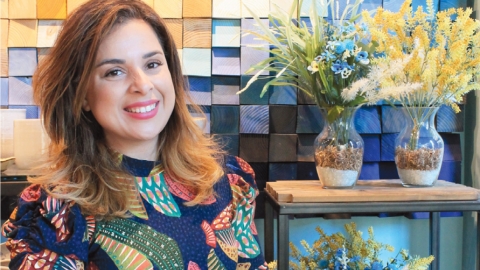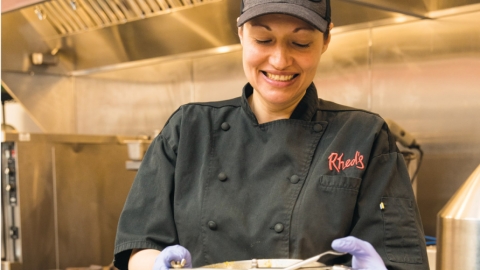Authentic Flavors of Home with Ethiopian Eats
Martha Tsegaye Shares Her Abundant Love of Ethiopian Cuisine at Weekly Farmers Markets
In Ethiopian culture, gursha is the act of feeding another a small bite of food with your hand. It’s a symbolic, significant gesture meant to express generosity and gratitude while simultaneously building connection and community and sharing love. Martha Tsegaye’s food business, Ethiopian Eats, embodies the spirit of gursha in every way, sharing her home-land and its vibrant culinary culture with every bite.
Tsegaye, who grew up in Addis Ababa, and her husband arrived in the U.S. in 2010, making their way to Rhode Island five years later. Encouraged by her family, including her two sons, the talented cook explored how she could share her traditional dishes with a wider audience.
“I ran a restaurant with my youngest sister in Ethiopia and the kitchen was my favorite part,” she says. To get the operational knowhow, Tsegaye studied business at CCRI. When she learned about Hope & Main, the culinary incubator in Warren that jump-starts “food-preneurs” by providing resources, including mentorship, an industry network and—crucially—a commercial kitchen, Tsegaye got to work. She developed recipes and crafted a menu of authentic prepared dishes to sell at area farmers markets. From day one, she had the attention and admiration of Hope & Main Founder and President Lisa Raiola.
“She is an inspiring woman. She runs every aspect of her business, in addition to holding up the tradition of Ethiopian foodways in our state,” says Raiola. As the only outlet providing Ethiopian and Eritrean cuisine in Rhode Island, Ethiopian Eats, Raiola explains, is more than just a food business—it’s a platform.
“Martha is not only serving her food, but she’s often educating people, in the best way, about Ethiopian cuisine and food heritage.”
In Hope & Main’s dedicated gluten-free kitchen, Tsegaye makes injera, Ethiopia’s well-known thin, spongy fermented flatbread made from teff flour. An ancient grain native to the Horn of Africa, teff is the smallest grain in the world and the cornerstone of Ethiopian cuisine. It’s a naturally gluten-free grain and enormously nutritious.
Injera is often enjoyed with seasoned beet-root and misir wot, a protein-rich spicy red lentil stew made with berbere, a traditional Ethiopian spice. “Beetroot, we call it ‘key sir.’ Key means ‘red’ and sir means ‘root.’ You can make the beetroot with carrots, potatoes or alone. It’s a side dish for us,” says Tsegaye. To prepare the dish, she takes a large, purple beetroot, the taproot portion of a beet plant, then shreds it before slowly cooking it, adding onions, tomatoes, herbs and spices, including turmeric, throughout the process. The result is a high-fiber, vita-min-rich, plant-based “heat and eat” dish.
Ethiopian Eats’ cross-cultural hybrid is Tsegaye’s injera “casserole”—a word she hadn’t heard before coming to America. It includes injera, misir wot (the red lentil stew) and collard greens topped with cheddar cheese (making it the only non-vegan dish she offers).
“She’s able to do this wonderful alchemy from our locally grown produce and make beautiful Ethiopian stews,” says Raiola. “I love to buy a few containers of her vegetarian foods with the injera bread, and it’s just a really satisfying meal—it feels like this sort of global, faraway flavor profile, but it’s locally sourced right here in Rhode Island.”
To say Tsegaye, a one-woman show, hustles is a huge understatement. “She is probably one of the hardest-working food-preneurs in this building,” says Raiola. Calling her a “solopreneur,” Raiola explains that wearing all the hats is a daunting role, from traveling to and from farmers markets across the state, plus setup and breakdown, to making all her food from scratch, managing orders, marketing, promotion and research and development (R&D).
“We helped her do some R&D and create these really beautiful injera chips where her Ethiopian flavor profiles come through,” says Raiola.
Raiola would love to see Tsegaye scale her business, but both women acknowledge the challenges that entrepreneurs face—work-force and capital are chief among them. But, as Tsegaye looks ahead, Raiola says it’s important to also look back to see how far she’s come.
“She’s a shining example of somebody who has really persisted and just done an incredible job with a business that is not easy,” says Raiola. “Everything about what she does is not easy, and yet she’s always positive.”
Andrea E. McHugh is a freelance writer who has written for the Hartford Courant, Baltimore Magazine, Daily Candy, Design Sponge, Providence Monthly and more. She resides in Newport.
For more information, including the Ethiopian Eats market schedule, visit Ethiopian-Eats.com and @ethiopian_eats.








